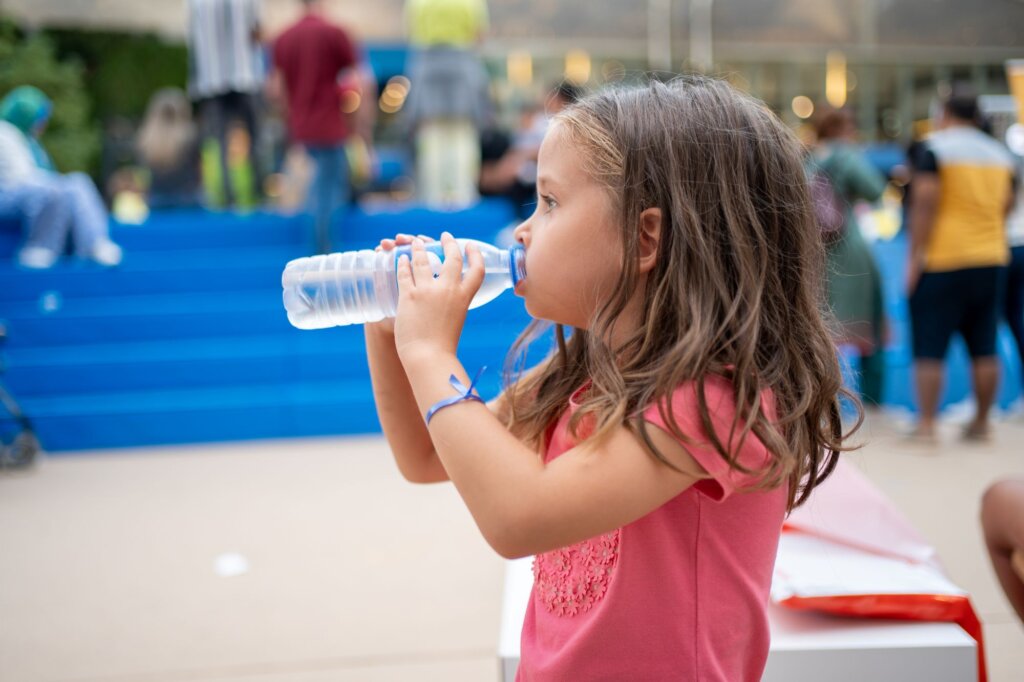Preventing Dehydration in Hot Weather: Summer Hydration Tips for Kids
When those summer temperatures rise, it’s important to make sure your child is staying hydrated. Kids are more prone to dehydration than adults, especially when they’re playing or being active outdoors and may not realize they’re thirsty. The good news is that with a few simple habits and reminders, you can keep your child safe, energized, and hydrated all summer long.
Why Kids Are More at Risk
Children’s bodies don’t regulate temperature or cool down as efficiently as adults’ bodies do, and they can get caught up in play without noticing the signs of thirst. Combine that with hot weather, and it’s easy for them to lose more fluids than they take in. Staying ahead of dehydration is key to preventing problems before they start.

Signs of Dehydration in Children
It’s not always easy to tell when a child is dehydrated, so watch your child for these common signs:
- Dry lips and mouth
- Less frequent wet diapers or bathroom trips
- Dark yellow urine
- Fatigue or crankiness
- Headaches or dizziness
- Less active or not playing as usual
If your child seems unusually tired, isn’t sweating during play, or says they’re feeling dizzy, take it seriously and get them out of the heat.
How Much Water Do Kids Need?
The amount of water kids need during the summer can vary on their age, activity level, the climate, and more, so there’s no one-size-fits-all answer. With that being said, general guidelines encourage:
- Toddlers (1–3 years): Between 2-4 cups (16-32 ounces) of water
- Young children (4–8 years): Around 5 cups (40 ounces)
- Older kids (9+): 7-8 cups (56-64 ounces) or more, especially if they’re active
Tips to Keep Kids Hydrated
Making hydration a habit is one of the best ways to make sure your child is drinking enough water.
- Offer water regularly: Don’t wait for your child to say they’re thirsty, and instead offer water regularly throughout the day.
- Make water more fun: Use colorful or themed cups, silly straws, or frozen fruit cubes to make water more exciting.
- Set a schedule: Offer drinks at regular intervals, especially before, during, and after outdoor play.
- Pack water for outings: Always bring a water bottle when heading to the park, pool, or any summer activity.
- Add water-rich snacks: Watermelon, cucumber, oranges, and strawberries are tasty, hydrating treats.
- Limit sugary drinks: Juice and sports drinks can be tempting, but they don’t hydrate as well as water and can add unnecessary sugar.
What to Do If Your Child Gets Dehydrated
Mild dehydration can usually be treated at home. Taking small and frequent sips of water and avoiding sugary drinks can help. Get your child to a cool place to rest.
Call your child’s pediatrician if your child:
- Can’t keep fluids down
- Is very tired or unresponsive
- Hasn’t urinated in over 8 hours
- Has dry, sunken eyes or cool, dry skin
It’s always better to be cautious. If something doesn’t feel right, reach out.
This article is meant for informational purposes only. If you have questions or would like further information, make an appointment with your child’s pediatrician.
This article was first published on WFMCHealth.org.
